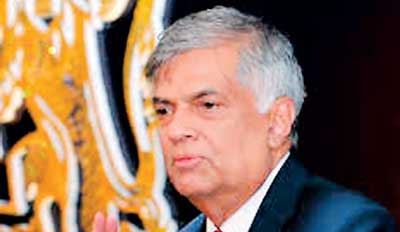Monday Feb 16, 2026
Monday Feb 16, 2026
Thursday, 11 August 2016 00:56 - - {{hitsCtrl.values.hits}}
By Ashwin Hemmathagama
Prime Minister Ranil Wickremesinghe yesterday gave a sweeping evaluation of the economy in Parliament, warning that debt could rise further while announcing a new tax system in 2017 and reassuring stakeholders that Indian nationals would not be allowed to work in Sri Lanka.
Responding to questions, Wickremesinghe recapped the challenging macroeconomic environment inherited by the Government in 2015 and elaborated on fresh plans laid out by his administration. He also clarified the process the Government had engaged in with the Chinese Government to make the Port City project more viable and profitable for Sri Lanka. He noted that the fresh agreement to be signed with the Chinese company would be presented in Parliament along with a special statement to be made by Megapolis and Western Development Minister Champika Ranawaka.
“The economy was crippled and was not in a position to go forward when President Maithripala Sirisena took over on 8 January. A never-ending cycle of borrowing was in place to service debt and its interest. The Government was in serious debt. In the absence of proper methods being followed, finding the total value was also a problem. The debt position was not completed even at the time the Budget 2016 was prepared. We also noticed the Government showing the borrowings made through certain institutions as earnings. So the real situation over the budget deficit or the total debt was not revealed.”
“We discussed our plan last December with the World Bank, IMF and the ADB. We were able to prepare a certificate on Government debt. We decided to reveal all and to add them to our total debt. We observed that the level could go up by 30% with more debt being revealed. We were not sure what could come out and therefore a full audit was required. In accordance with a Cabinet decision, a three-member committee was appointed in March this year to investigate the debt position. We will be able to confirm the actual debt position only after its report is completed,” he added.
Unable to calculate the total debt incurred during the Government of former President Mahinda Rajapaksa, Prime Minister Ranil Wickremesinghe also cautioned the Parliament to expect debt to rise to a whopping Rs. 10 trillion.
The total debt stood at Rs. 8,475 billion at the last Budget, according to him and it was equal to 74.9% of the GDP. “The debt of public enterprises is not included in the total debt. According to what we found up to now, there is Rs. 1,358 billion in debt, which needs to be added to the accounts. CPC Rs. 424 billion, Ports Authority Rs. 240 billion, SriLankan Airlines Rs. 308 billion, Ceylon Electricity Board Rs. 237 billion are some of the debt on a long list. So this year’s debt servicing will be Rs. 1,209 billion,” said the Prime Minister, who accused the previous Government of leaving critical loans out of the Consolidated Fund.
Speaking about loss-making public ventures, he said: “No boost was received to uplift the economy from the development programs launched under the previous Government. They constructed an airport which had no flights and a harbour without ships. They didn’t have a proper plan to make use of these two ports. We were the first to allocate land closer to the port with the aim of starting an export zone. The previous Government was able to trap the country in debt exceeding Rs. 9.5 trillion. There are chances that it could reach over Rs. 10 trillion.”
Wickremesinghe promised to double the GDP by 2024 by initiating a slew of new trade agreements including the Economic Technology Cooperation Agreement with India. Revisiting an enduring point of contention, Wickremesinghe reiterated that Indian nationals would not be allowed to work locally.
“Our aim is to get out of this debt trap. Many believe that this Government is capable of doing this. On the other hand, we have an unfavourable global economy. Borrowing more will not help us to solve this problem. Our attention is now on developing a tax system to suit today’s demands. We are looking at a new revenue collection system in parallel from 2017. Following proper policies, we are looking at doubling the GDP by 2024 and elevating Sri Lanka to a higher income tier by 2035,” he added.